News | Ebola
| 'Deadly environment' plus 'political and social' obstacles hinder Ebola fight, Security Council hears | |
UN News - July 24, 2019 | |
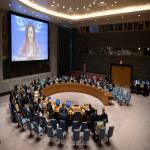 | The problems of eradicating Ebola in the Democratic Republic of the Congo are not only medical, but also linked “to a variety of political and social factors”, the head of the UN mission in the country told the Security Council. |
| Ebola outbreak declared an international Public Health Emergency | |
UN News - July 17, 2019 | |
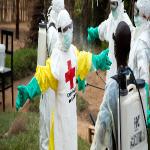 | The second worst Ebola outbreak of all time, in the Democratic Republic of the Congo (DRC), was officially declared an international Public Health Emergency of International Concern on Wednesday, with the head of the World Health Organization calling for countries to ‘take notice and redouble our efforts”. |
| DR Congo: The country that knows how to beat Ebola | |
World Health Organization - December 11, 2014 | |
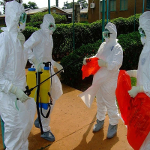 | “In DRC there was long experience with Ebola – this was the seventh outbreak of the disease here. The country had the knowledge and the people needed to stop an outbreak – plus strong technical assistance and support from WHO,” says Dr Joseph Waogodo Cabore, WHO Representative to DRC. “It is an impressive achievement, considering that overall, the country’s health system has serious weaknesses.” |
| Ebola Epidemic Resurfaces in DR Congo's Equateur Province | |
Radio Okapi - August 25, 2014 | |
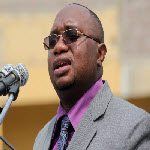 | DR Congo is facing an Ebola epidemic for the seventh time since 1976. Officials announced on Sunday that the disease had resurfaced in Dejra, Equateur Province. The Minister of Public Health, Felix Kabange Numbi, said that the experience gained from the previous six epidemics will be put to use to contain the disease. The Djera area has been put under quarantine. |
| End of Ebola outbreak | |
WHO - February 17, 2009 | |
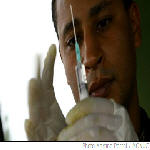 | The Ministry of Health of the Democratic Republic of the Congo (DRC) has on 16 February 2009 declared the end of the Ebola epidemic in the Mweka and Luebo health zones in the Province of Kasai Occidental . The last person to be infected by the virus died on 1 January 2009. This is more than double the maximum incubation period (42 days) for Ebola. |
| UN calls on rebels to resume talks with Government | |
UN News - January 2, 2009 | |
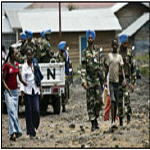 | The United Nations peacekeeping mission in the Democratic Republic of the Congo (DRC) today called on the main rebel group in the east of the vast country to resume talks with the Government next week in a bid to end fighting that has forced over 250,000 from their homes since August. |
| Government announces end of Ebola outbreak | |
IRIN - November 20, 2007 | |
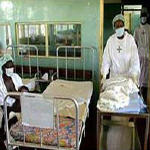 | Health officials in the Democratic Republic of Congo (DRC) said an outbreak of Ebola haemorrhagic fever, which claimed the lives of 21 of the 26 people infected in the Kasai Occidental province, is now over. |
| United States Support to the Democratic Republic of the Congo | |
US Department of State Office of the Spokesman - October 31, 2007 | |
We support the Congolese people in their efforts to promote peace and democratic values in the post-transition period. Our assistance helps to consolidate peace through efforts to revitalize the economy, enhance national security, deliver basic services, and strengthen governance and rule of law. In FY07, we provided over $462 million in assistance to the DRC, including $77 million in development, and security assistance, $85 million in humanitarian assistance (including refugee support) and $300 million to support the peace keeping mission. | |
| Monitoring of Ebola "must continue" | |
IRIN - October 3, 2007 | |
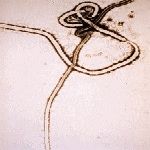 | Health specialists agree that surveillance and monitoring of an Ebola epidemic have to be maintained, despite falls in the numbers of people affected in the province of Kasai Occidental in the Democratic Republic of Congo. |
| CDC scientists travel to Democratic Republic of the Congo to fight Ebola outbreak | |
CDC - October 1, 2007 | |
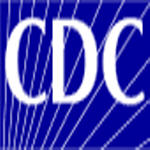 | Scientists from the Centers for Disease Control and Prevention deployed to the Democratic Republic of the Congo (DRC) to support efforts to control an outbreak of Ebola hemorrhagic fever in a remote province. Early reports described a range of symptoms in patients, making accurate clinical diagnosis impossible. Upon receipt of samples from the affected area, CDC scientists at the Special Pathogens Branch were able to diagnose Ebola virus infection in some patients. Evidence of Shigella dysenteriae and Salmonella typhi infection was also observed. |







